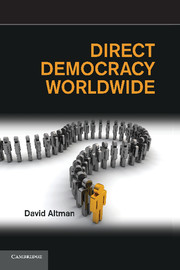Book contents
- Frontmatter
- Contents
- Tables
- Figures
- Preface and Acknowledgments
- Abbreviations
- 1 Direct Democracy at the Turn of the Century
- 2 Terms of the Debate Surrounding Direct Democracy
- 3 Myths and Facts behind the Use of Mechanisms of Direct Democracy
- 4 Direct Democracy within Nondemocratic Regimes
- 5 Direct Democracy within Weak Democracies
- 6 Direct Democracy within Democracies
- 7 Uruguayan Citizen-Initiated Mechanisms of Direct Democracy as Agents of Vertical Accountability
- 8 Conclusions
- Appendix
- References
- Index
7 - Uruguayan Citizen-Initiated Mechanisms of Direct Democracy as Agents of Vertical Accountability
Published online by Cambridge University Press: 01 March 2011
- Frontmatter
- Contents
- Tables
- Figures
- Preface and Acknowledgments
- Abbreviations
- 1 Direct Democracy at the Turn of the Century
- 2 Terms of the Debate Surrounding Direct Democracy
- 3 Myths and Facts behind the Use of Mechanisms of Direct Democracy
- 4 Direct Democracy within Nondemocratic Regimes
- 5 Direct Democracy within Weak Democracies
- 6 Direct Democracy within Democracies
- 7 Uruguayan Citizen-Initiated Mechanisms of Direct Democracy as Agents of Vertical Accountability
- 8 Conclusions
- Appendix
- References
- Index
Summary
This chapter has two main objectives. The first is to determine under which combination of institutional and political factors MDDs manage to limit the action and political desires of the government and thus become a weapon of political control in the hands of the citizenry. With this objective, this research selects from all MDD occurrences in Uruguay when the government and the promoters of the initiative held contrasting positions. Using the Uruguayan experience, this section explains what takes place when governments lose and organized citizens win – what combination of factors and conditions is necessary and/or sufficient to approve a CI-MDD. The second objective is to study the other side of the coin: how political elites relate to CI-MDDs – institutions that, for better or worse, literally have taken political decisions from politicians' hands. Given that these institutions help citizens “invade” the territory of elites, politicians presumably are likely to hold CI-MDDs in low regard, or at least view them in a rather negative manner.
Stressing the Complexity of Social Phenomena: Objectives, Methods, and Hypotheses
This section explores the combination of factors that are necessary and/or sufficient conditions to approve a CI-MDD (or for the government to lose) in Uruguay. Specifically, this research has as its dependent variable those MDDs in which the executive was averse to the objectives of the promoters of the measure.
- Type
- Chapter
- Information
- Direct Democracy Worldwide , pp. 162 - 187Publisher: Cambridge University PressPrint publication year: 2010



